Related Research Articles

Montague Rhodes James was an English author, medievalist scholar and provost of King's College, Cambridge (1905–1918), and of Eton College (1918–1936). He was Vice-Chancellor of the University of Cambridge (1913–15).
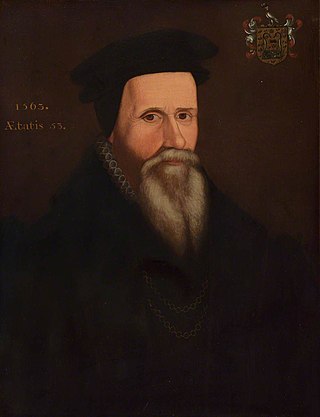
John Caius, also known as Johannes Caius and Ioannes Caius, was an English physician, and second founder of Gonville and Caius College, Cambridge.
Robert Woodhouse was a British mathematician and astronomer.

Anthony William Fairbank Edwards, FRS is a British statistician, geneticist and evolutionary biologist. He is the son of the surgeon Harold C. Edwards, and brother of medical geneticist John H. Edwards. He has sometimes been called "Fisher's Edwards" to distinguish him from his brother, because he was mentored by Ronald Fisher. Edwards has always had a high regard for Fisher's scientific contributions and has written extensively on them. To mark the Fisher centenary in 1990, Edwards proposed a commemorative Sir Ronald Fisher window be installed in the Dining Hall of Gonville & Caius College. When the window was removed in 2020, he vigorously opposed the move.

Thomas Muffet was an English naturalist and physician. He is best known his study of insects and arthropods in regard to medicine, his support of the Paracelsian system of medicine, and his emphasis on the importance of experience over reputation in the field of medicine. He was an Anti-papist due to his Puritan beliefs.

William Branthwaite (1563–1619) was an English scholar and translator.
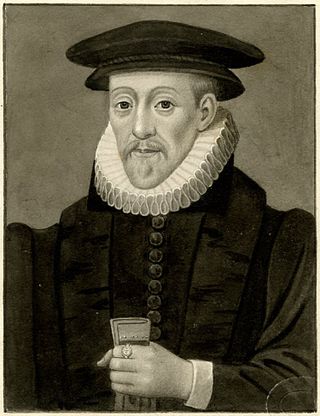
Thomas Legge was an English playwright, prominently known for his play Richardus Tertius, which is considered to be the first history play written in England.
James Dugdale was an Oxford academic and administrator. He was Fellow and Master of University College, Oxford.
Walter Haddon LL.D. (1515–1572) was an English civil lawyer, much involved in church and university affairs under Edward VI, Queen Mary, and Elizabeth I. He was a University of Cambridge humanist and reformer, and was highly reputed in his time as a Latinist. He sat as an MP during the reigns of Mary and Elizabeth. His controversial exchange with the Portuguese historian Jerónimo Osório attracted international attention partly on account of the scholarly reputations of the protagonists.

Gonville and Caius College, often referred to simply as Caius, is a constituent college of the University of Cambridge in Cambridge, England. Founded in 1348 by Edmund Gonville, it is the fourth-oldest of the University of Cambridge's 31 colleges and one of the wealthiest. In 1557, it was refounded by alumnus John Caius. The college has been attended by many students who have gone on to significant accomplishment, including fifteen Nobel Prize winners, the second-highest of any Oxbridge college after Trinity College, Cambridge.
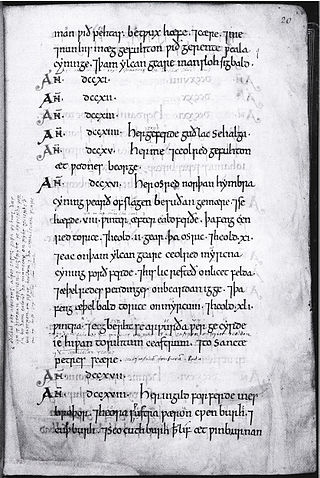
John Joscelyn, also John Jocelyn or John Joscelin, (1529–1603) was an English clergyman and antiquarian as well as secretary to Matthew Parker, an Archbishop of Canterbury during the reign of Queen Elizabeth I of England. Joscelyn was involved in Parker's attempts to secure and publish medieval manuscripts on church history, and was one of the first scholars of the Old English (Anglo-Saxon) language. He also studied the early law codes of England. His Old English dictionary, although not published during his lifetime, contributed greatly to the study of that language. Many of his manuscripts and papers eventually became part of the collections of Cambridge University, Oxford University, or the British Library.
Thomas Benwell was a Master of University College, Oxford, England.
Thomas Bacon was the fifteenth master of Gonville Hall, Cambridge from 1552.

Charles Oscar Brink was a German-Jewish classicist and Kennedy Professor of Latin at Cambridge University.
Robert of Cricklade was a medieval English writer and prior of St Frideswide's Priory in Oxford. He was a native of Cricklade and taught before becoming a cleric. He wrote several theological works as well as a lost biography of Thomas Becket, the murdered Archbishop of Canterbury.
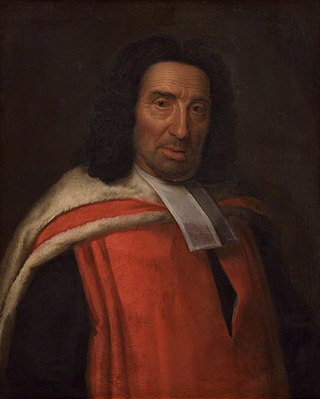
Sir John Ellys or Ellis (1634?–1716) was an English academic, Master of Gonville and Caius College, Cambridge from 1703.
Adam Squire or Squier was an English churchman and academic, Master of Balliol College, Oxford, from 1571 to 1580, and Archdeacon of Middlesex from 1577.
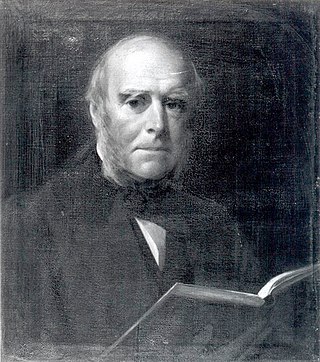
William Bodham Donne (1807–1882) was an English journalist, known also as a librarian and theatrical censor.
John Styrmin was a 16th-century priest and academic.
Thomas Singleton was an English clergyman and academic.
References
- 1 2 Boarse, C. W. (1887). "The Renaissance and the Reformation". In Freeman, E. A.; Hunt, W. (eds.). Oxford. Historic Towns. London: Longmans, Green, and Co. pp. 127–128.
- ↑ Carr, William (1998). "VI: The Sixteenth Century". University College. Routledge. ISBN 978-0-415-18632-2.
- ↑ Darwall-Smith, Robin (2008). "Thomas Caius". A History of University College, Oxford. Oxford University Press. pp. 104–108. ISBN 978-0-19-928429-0.